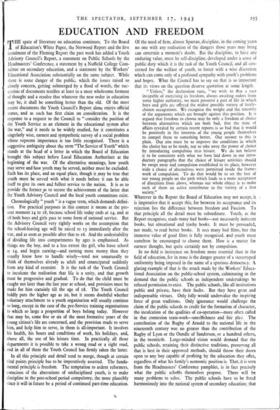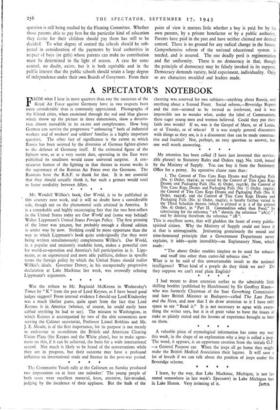EDUCATION AND FREEDOM
THE spate of literature on education continues. To the Board of Education's White Paper, the Norwood Report and the first instalment of the Fleming Report the past week has added a Youth Advisory Council's Report, a statement on Public Schools by the Headmasters' Conference, a statement by a Nuffield College Com- mittee on secondary education, and a statement by the Workers' Educational Association substantially on the same subject. While there is some danger of the public, which the issues raised so closely concern, getting submerged by a flood of words, the suc- cession of documents testifies at least to a most wholesome ferment of thought and a resolve that whatever the new order in education may be, it shall be something better than the old. Of the most recent documents the Youth Council's Report alone enjoys official status, and as such has first claim on consideration. It is the response to a request to the Council to " consider the position of the Youth Service as an element in the educational system after the war," and it needs to be widely studied, for it constitutes a singularly wise, earnest and sympathetic survey of a social problem whose supreme importance is too little recognised. There is a suggestive ambiguity about the term "The Service of Youth" which stands at the head of a letter in which the Board of Education brought this subject before Local Education Authorities at the beginning of the war. Of the alternative meanings, how youth may serve and how youth may be served, neither must be excluded. Each has its place, and an equal place, though it may be true that youth must be served with what it needs before it can be able itself to give its own and fullest service to the nation. It is so to provide the former as to secure the achievement of the latter that the Youth Advisory Council and the local youth committees exist.
Chronologically " youth " is a vague term, which demands defini- tion. For practical purposes in this context it means at the pre- sent moment 14 to 18, because school life today ends at 14, and at 18 both boys and girls pass to some form of national service. But the Advisory Council very rightly works on the assumption that the school-leaving age will be raised to 15 immediately after the war, and as soon as possible after that to 16. And the undesirability of dividing life into compartments by ages is emphasised. As things are the boy, and to a less extent the girl, who leave school at 14, and begin earning—and earning more money than they usually know how to handle wisely—tend not unnaturally to think of themselves already as adult and emancipated suddenly from any kind of restraint. It is the task of the Youth Council to inculcate the realisation that life is a unity, and that growth must be progressive and gradual. To do that the child must be caught not later than the last year at school, and provision must be made for him certainly till the age of 18. The Youth Council boldly puts the higher age as zo, but it seems doubtful whether voluntary attachment to a youth organisation will usually continue so long, except in the case of the pre-Service training organisations to which so large a proportion of boys belong today. However that may be, some five or six of the most formative years of the young citizen's life are concerned, and the provision made to serve him, and help him to serve, in them is all-important. It involves his health, his hours and conditions of work, his holidays, and, above all, the use of his leisure time. In practically all those departments it is possible to take a wrong road or a right road, and in all of them the Youth Council has firmly taken the latter.
In all this principle and detail tend to merge, though at certain vital points principle has to be imperatively asserted. The funda- mental principle is freedom. The temptation to ardent reformers, conscious of the aberrations of undisciplined youth, is to make discipline in the post-school period compulsory, the more plausibly since it will in future be a period of continued part-time education. Of the need of firm, almost Spartan, discipline, in the coming years no one with any realisation of the dangers those years may bring can entertain a moment's doubt. But the discipline, to have any enduring value, must be self-discipline, developed under a sense of public duty which it is the task of the Youth Council, and all con- cerned for the welfare of youth, to foster with a wise discretion which can come only of a profound sympathy with youth's problems and hopes. What the Council has to say on that is so important that its views on the question deserve quotation at some length.
" Unless," the declaration runs, " we wish to fear a race incapable of exercising its freedom, always awaiting orders from some higher authority, we must preserve a part of life in. which boys and girls are offered the widest possible variety of freely- chosen occupations. We recognise the weight and the sincerity of the arguments which are brought against this position. It is argued that freedom to choose may be only a freedom of choice between alternatives which are both bad, that the state of affairs revealed by certain recent reports is so bad that it would be positively in the interests of the young people themselves to compel them to something better. Our answer to this is plain. Our aim must be to improve the conditions in which the choice has to be made, not to take away the power of choice by introducing compulsion into leisure. We do not believe it to be consistent with what we have laid down in our intro- ductory paragraphs that the choice of leisure activities should be swept away and compulsion established in its place, however wide a choice of alternatives were permitted inside the frame= work of compulsion. To do that would be to set the feet of our young people on the path which leads to a mute acceptance of directions from above, whereas our whole object is to make each of them an active contributor to the variety of a free society."
Whatever in the Report the Board of Education may not accept, it is imperative that it accept this, for between its acceptance and its rejection lies the difference between freedom and Fascism. To that principle all the detail must be subordinate. Youth, as the Report recognises, reads many bad books—not necessarily indecent books, but sensational and trashy books. It must be persuaded, not made, to read better books. It sees many bad films, but the immense value of good films is fully recognised, and youth must somehow be encouraged to choose them. How is a matter fot earnest thought, but quite certainly not by compulsion.
In no field is insistence on freedom more essential than in the field of education, for in none is the danger greater of a stereotyped uniformity being imposed in the name of a spurious democracy. A glaring example of that is the attack made by the Workers' Educa- tional Association on the public-school system, culminating in the demand that the public schools as independent undertakings be refused permission to exist. The public schools, like all institutions public and private, have their faults. But they have great and indispensable virtues. Only folly would undervalue the inspiring force of great traditions. Only ignorance would challenge the claim of the public schools to credit for the formation of character, the. inculcation of the qualities of co-operation—more often called in that connexion team-work—unselfishness and fair play. The contribution of the Rugby of Arnold to the national life in the nineteenth century was no greater than the contribution of the Rugby of Lyon or the Oundle of Sanderson, or a hundred others, in the twentieth. Large-minded vision would demand that the public schools, retaining their distinctive traditions, preserving all that is best in their approved methods, should throw their doors open to-any boy capable of profiting by the education they offer, regardless of what his family's economic position is. That, it is seen from the Headmasters' Conference pamphlet, is in fact precisely what the public schools themselves propose. There will be many problems to solve. The public schools have to be fitted harmoniously into the national system of secondary education; that question is still being studied by the Fleming Committee. Whether those parents able to pay fees for the particular kind of education they desire for their children should pay them has still to be decided. To what degree of control the schools should be sub- jected in consideration of the payments by local authorities in respect of boys (or girls) whose parents can make no contribution must be determined in the light of reason. A case for some control, no doubt, exists, but it is both equitable and in the pubic interest that the public schools should retain a large degree of independence under their own Boards of Governors. From their point of view it matters little whether a boy is paid for by his own parents, by a private benefactor or by a public authority. Parents have paid in the past and have neither claimed nor desired control. There is no ground for any radical change in the future. Comprehensive. reform of the national educational system is needed, and is assured. The one deadly peril is regimentation and fiat uniformity. There is no democracy in that, though the principle of democracy may be falsely invoked in its support. Democracy demands variety, bold experiment, individuality. Only so are characters moulded and leaders made.



























 Previous page
Previous page